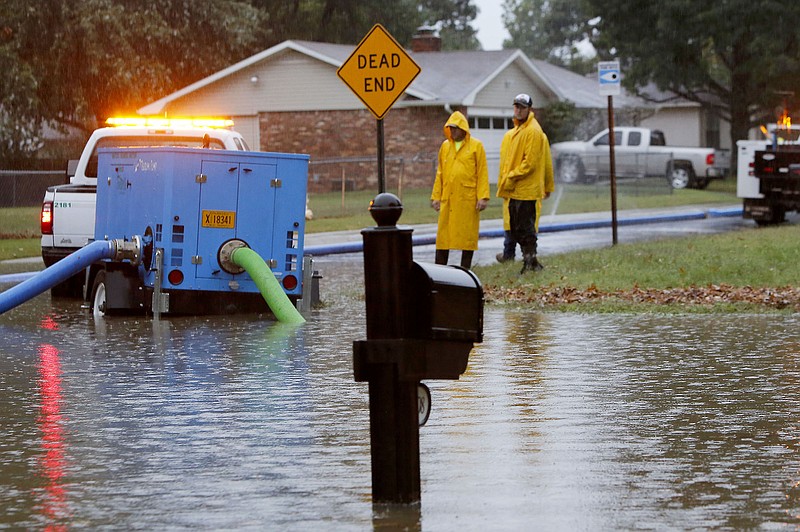FAYETTEVILLE -- Proposed regulation changes should help lessen flooding for neighbors living near new residential construction built on single lots, Fayetteville city staff members say.
Homebuilders say a more nuanced approach is needed.
The City Council on Tuesday will consider changes to city code addressing stormwater requirements for certain developments. Right now, code requires stormwater mitigation measures based on the type of land use and the number of residential units.
Single-family homes and duplexes on small lots for the most part are exempt from stormwater requirements. Developers often split larger parcels into smaller, individual ones. This way, they avoid having to mitigate the impact from adding impervious surface area such as driveways and roofs, city staff members say.
The new rules would apply to single-lot developments, not subdivisions. Developers of entire subdivisions, by contrast, have to include detention ponds in their plans and replace trees lost to construction, along with other ways to account for the runoff development can cause.
The city wants to require stormwater mitigation based on total, new, impervious surface area such as rooftops and concrete. Developments adding 1,200 or fewer square feet of impervious surface would remain exempt. Developments with 1,201 to 6,000 square feet of new, impervious surface area would be subject to certain standards, and developments with 6,001 or more square feet would be subject to more standards.
Alan Pugh, staff engineer with the city, said one goal is to reduce the amount of runoff coming from new developments to neighboring properties. Another is to encourage developers to pursue denser housing types, he said.
Single-family homes and duplexes are easier and less expensive to build, so developers don't have an incentive to build denser, Pugh said. Denser housing types can include triplexes, quadplexes or cottage homes with shared courtyards.
One of the city's goals is to encourage infill development, meaning an increased number of units on unused or underused lots.
COMPLICATING THE ISSUE
The city made a goal to promote infill development, so it should make it easier for developers to build those kinds of projects -- not harder, said Ben Booth with Booth Building & Design. Booth also is past president of the Northwest Arkansas Home Builders Association.
Booth's company builds custom homes, often on single lots. He said building on smaller lots already presents challenges because of less room to operate. Applying a set of drainage standards could raise the cost to build immensely, he said.
Many infill projects happen in older neighborhoods full of homes that were built before any kind of drainage code was established. If a developer comes in with a new project, he may have to account for the water coming from surrounding properties as well as his own, Booth said.
Drainage measures for a small lot can be expensive. It may take underground detention, which can be a huge expense on top of soaring construction costs, he said.
"You throw that in with the fact that everything is three and four times what it cost two years ago, you kill projects," he said. "It's interesting to me they want to add another layer of cost and red tape to projects they encourage."
Booth suggested drainage measures be required on a case-by-case basis and implemented according to the unique traits of a project and piece of land. Basing blanket measures on total added impervious surface area is painting with too broad a brush, he said.
Developers often opt to split parcels because the jump regulation-wise from building a single-family home or duplex to housing with three to six units or more is such a large one, Booth said.
"You might as well build a Walmart," he said.
THE BIGGER PLAN
Changing city code on single-lot development is part of a three-pronged approach to fixing drainage issues for the next several years.
A proposal to add a fee to residents' monthly water bills to help pay for drainage work across the city might go before the City Council this fall, Public Works Director Chris Brown said.
City staff and consulting firm Jacobs Engineering have been working over the past few years to determine a cost structure for the fee. The city sent mailers to residents in 2019 with some proposed monthly rates for property owners to provide an idea of what the fee might look like.
Rates ranged from $2.31 for a 1,000-square-foot home with no garage or carport to $13.41 for a 4,500-square-foot house with a three-car garage. The fee would generate about $3 million annually, staff members said at the time.
Commercial and institutional properties also would be subject to a fee. The City Council will make the final decision on the rates.
Residents are two or three years away from potentially seeing the drainage fee on their water bills, Brown said. The pandemic delayed development of the rates, he said.
Residents in April 2019 approved a $15 million drainage bond issue paid for through an extension of a 1 percent sales tax. The city also spends $1.5 million annually from its capital budget to address flooding.
City staff members say the annual allocation and the bond issue aren't enough to fix flooding in the city, necessitating the drainage fee. A study from Jacobs found the city has about $34.6 million in drainage projects that need to be addressed over the next 20 years.
PROPOSED STORMWATER REGULATIONS
Fayetteville is considering changing city code so stormwater regulations would be determined by added impervious surface area for new developments, rather than by land use and number of units. To see the full details of the proposal visit http://nwaonline.co…">nwaonline.com/613dr…
Source: Fayetteville
